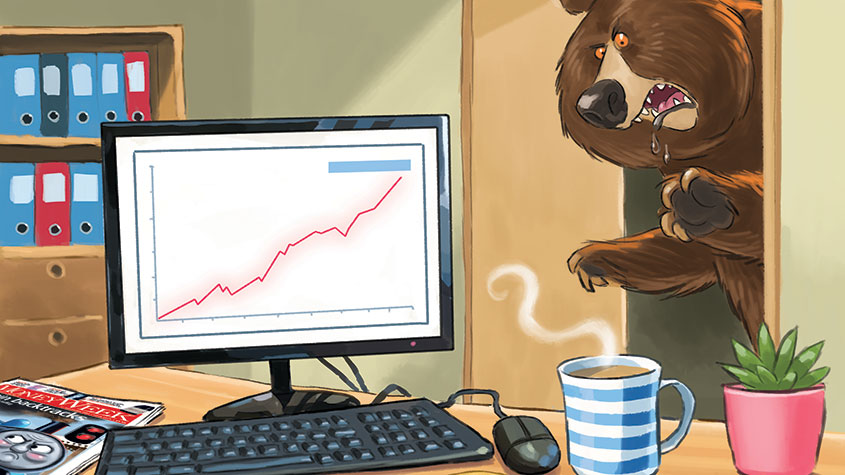Towards FTSE 12,000?
The FTSE 100 reaching 12,000 may be a punchy forecast, says John Stepek. But it's not impossible.

Get the latest financial news, insights and expert analysis from our award-winning MoneyWeek team, to help you understand what really matters when it comes to your finances.
You are now subscribed
Your newsletter sign-up was successful
Want to add more newsletters?

Twice daily
MoneyWeek
Get the latest financial news, insights and expert analysis from our award-winning MoneyWeek team, to help you understand what really matters when it comes to your finances.

Four times a week
Look After My Bills
Sign up to our free money-saving newsletter, filled with the latest news and expert advice to help you find the best tips and deals for managing your bills. Start saving today!
In 2008, right after Lehman Brothers went bust, Phil Anderson wrote a cover story for MoneyWeek.
Looking back at that issue (number 405, if you want to look it up), our news section was reporting that the world's central banks had slashed interest rates by 0.5%, in a co-ordinated move to stem the panic, while the personal finance page was all about the demise of Icelandic internet bank Icesave. A bit of a scary time for investors, all told.
But Phil took the long view. He acknowledged that we were in a grim situation, and that property prices would fall for a few years yet. But he also reckoned the upturn would arrive in 2011, and that US stocks could start rising again as early as 2009, but certainly by 2010.
MoneyWeek
Subscribe to MoneyWeek today and get your first six magazine issues absolutely FREE

Sign up to Money Morning
Don't miss the latest investment and personal finances news, market analysis, plus money-saving tips with our free twice-daily newsletter
Don't miss the latest investment and personal finances news, market analysis, plus money-saving tips with our free twice-daily newsletter
I'll admit, I was sceptical. Glued to the office Bloomberg terminal, which was spurting out news of the latest profit warning or bankrupt bank, it was easy to worry that we might not have an economy left by 2011, let alone one witnessing the green shoots' of recovery. But Phil was right.
Whatever gross distortions of capitalism and monetary policy it took to get us here, the stock markets and increasingly the property markets on both sides of the Atlantic have enjoyed a stupendous recovery from the dark days of the bust.
In fact, now various voices are warning that everything looks a bit toppy and we're due another big crash. So this week we got Phil and his colleague, Akhil Patel, to update us on their views. Their take? This bull market isn't over yet, not by a long chalk.
I'll let you read the story yourself. But their point is that these property-driven market cycles happen regularly, and as humans don't really change much, they follow a predictable pattern.
I'll admit I find the idea of the FTSE 100 at 12,000 or more (even if it's ten years from now) a punchy forecast. But it's also hard to believe we'll see a repeat of 2008 soon. So I'll suspend my scepticism this time at least a little.
Markets aren't the only things that movein cycles. So do financial products.The government's new plan for collective defined contribution (CDC) pensions is a good example.
A CDC is a traditional defined contribution scheme with a twist: you pool your money with yourco-workers in one big fund, and the people who run it try to smooth' the returns so you get a more predictable income when you retire.
What does that remind you of? That's right it's a with-profits' fund. The goal behind CDCs is admirable pensions should cost less and be more transparent and the government's other reforms have been good. But it's hard to see CDCs working.
One of the most predictable phenomena in finance whether it be Bank of England inflation forecasts or actuarial tables is over-optimism. If I was retiring in five years' time, I might join a CDC but only because I'd expect to profit at the expense of a future pensioner taking a big pay-out cut 20 years from now.
Get the latest financial news, insights and expert analysis from our award-winning MoneyWeek team, to help you understand what really matters when it comes to your finances.

-
 How a ‘great view’ from your home can boost its value by 35%
How a ‘great view’ from your home can boost its value by 35%A house that comes with a picturesque backdrop could add tens of thousands of pounds to its asking price – but how does each region compare?
-
 What is a care fees annuity and how much does it cost?
What is a care fees annuity and how much does it cost?How we will be cared for in our later years – and how much we are willing to pay for it – are conversations best had as early as possible. One option to cover the cost is a care fees annuity. We look at the pros and cons.
-
 What to do as the age of cheap money and overpriced equities ends
What to do as the age of cheap money and overpriced equities endsEditor's letter The age of cheap money, overpriced equities and negative interest rates is over. The great bond bull market is over. All this means you will be losing money, says Merryn Somerset Webb. What can you do to protect yourself?
-
 Investors are bullish – but be very careful
Investors are bullish – but be very carefulEditor's letter Many investors are buying the dip, convinced the latest upswing is the start of a new bull market. The odds are that it’s not, says Andrew Van Sickle. The bear has unfinished business.
-
The MoneyWeek approach to investing
Editor's letter At MoneyWeek, our aim is simple: to give you intelligent and enjoyable commentary on the most important financial stories, and tell you how to profit from them. So how do we do that?
-
 Celebrity bitcoin ads echo the subprime mortgage crisis
Celebrity bitcoin ads echo the subprime mortgage crisisEditor's letter A wave of ads featuring celebrities punting crypto to the masses are reminiscent of how low income Americans were encouraged to take on loans they couldn’t afford, says Merryn Somerset Webb.
-
 Will the UK's property slowdown turn into a house-price crash?
Will the UK's property slowdown turn into a house-price crash?Editor's letter As the cost-of-living crisis intensifies and interest rate rise, it is hard to see reasons for UK house prices to keep rising, says Merryn Somerset Webb.
-
 The unintended consequences of ESG investing
The unintended consequences of ESG investingEditor's letter Many people are refusing to invest in energy companies, citing "ESG" concerns. But we still need fossil fuels, says Merryn Somerset Webb, and will for years to come. Boycotting the sector is a bad idea.
-
 What sardines can teach investors about today's markets
What sardines can teach investors about today's marketsEditor's letter A California tale of “eating sardines” and “trading sardines” can help us divide investments into speculative and real, says Merryn Somerset Webb. Something that's very useful when looking at today’s markets.
-
 The market finally seems to be getting it
The market finally seems to be getting itEditor's letter Reality checks are coming fast to the markets, says Merryn Somerset Webb – with even 2022’s safe havens beginning to reflect recession worries.